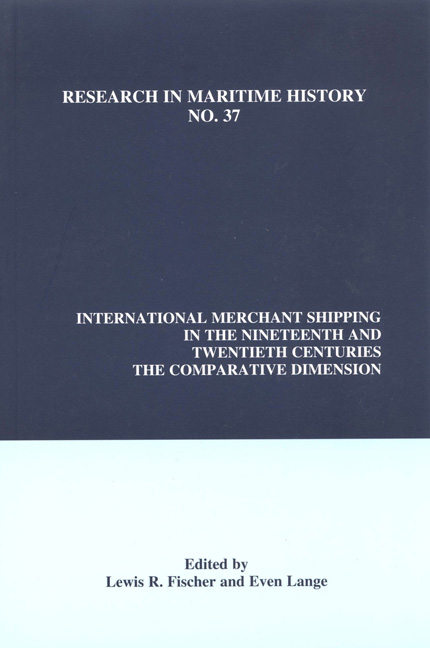Book contents
- Frontmatter
- Contents
- Contributors' Notes
- Contributors
- Introduction
- “Growth, Diversification and Globalization: Main Trends in International Shipping since 1850”
- “Norwegian Shipping in the Twentieth Century”
- “The Greek Shipping Sector, c. 1850-2000”
- “A Guide to the Emergence of Japan's Modern Shipping Industries”
- “British Shipping from the Late Nineteenth Century to the Present”
- “North of England Shipowners and Their Business Connections in the Nineteenth Century”
- “Network Structures, Processes and Dynamics: Inter-firm Cooperative Frameworks in the Shipping Industry”
“Growth, Diversification and Globalization: Main Trends in International Shipping since 1850”
- Frontmatter
- Contents
- Contributors' Notes
- Contributors
- Introduction
- “Growth, Diversification and Globalization: Main Trends in International Shipping since 1850”
- “Norwegian Shipping in the Twentieth Century”
- “The Greek Shipping Sector, c. 1850-2000”
- “A Guide to the Emergence of Japan's Modern Shipping Industries”
- “British Shipping from the Late Nineteenth Century to the Present”
- “North of England Shipowners and Their Business Connections in the Nineteenth Century”
- “Network Structures, Processes and Dynamics: Inter-firm Cooperative Frameworks in the Shipping Industry”
Summary
Introduction: Shipping and International Trade
For almost five decades the history of long-term trends in global ocean transport has attracted the interest mainly of economists and economic historians rather than maritime historians. Maritime historians, on the other hand, have concentrated on topics which have been more limited in chronological or geographical scope or with special aspects of shipping history. This paradox likely reflects the different traditions of the various specialties. Maritime historians typically have been empirically oriented scholars who know all too well the gaps in our understanding of many of the most important trends of international shipping, even for a period as recent as the last century and a half. Rather than attempting far-reaching speculations, they prefer to collect reliable data from smaller parts of the universe which can be adequately mapped with available resources and to produce analyses solidly founded on such material. Economists, on the other hand - at least compared with historians - depend more on theoretical approaches and logical deductions than empirical analyses and are primarily interested in general rules of economic behaviour and development. Their interest in shipping history is explained by a concern with the growth of international trade, especially after 1850, since it is generally believed that this - in addition to factors like tariff policies and exchange systems - was triggered by a decline in transport costs. As a result, ocean shipping became one of the major exogenous variables to explain the rapid economic growth.
Since the demand for shipping services is closely connected to the volume of goods exchanged, the growth of international trade is undoubtedly a meaningful context within which to study the fundamental trends and crucial developments of maritime transport. Yet the doubts of the empiricists are far from irrelevant: the availability of quantitative (or quantifiable) data, in particular on the aggregate level, is tightly bound to anno domini : while there is a fairly satisfactory supply of statistics on global shipping, merchant tonnage and freight development for the 1980s and 1990s, the dearth of material places serious constraints on the study of the late nineteenth and early twentieth centuries. Considering this asymmetrical distribution of data, it is surprising that much more research has been conducted on the late nineteenth than on the late twentieth century.
- Type
- Chapter
- Information
- International Merchant Shipping in the Nineteenth and Twentieth CenturiesThe Comparative Dimension, pp. 1 - 56Publisher: Liverpool University PressPrint publication year: 2008



